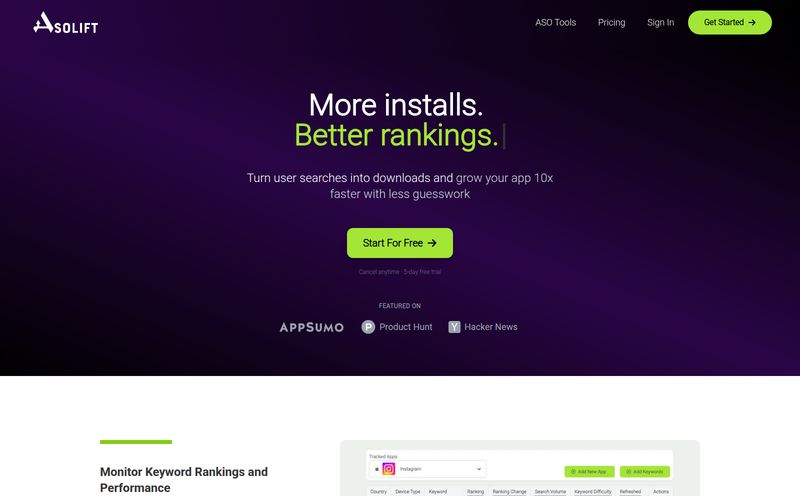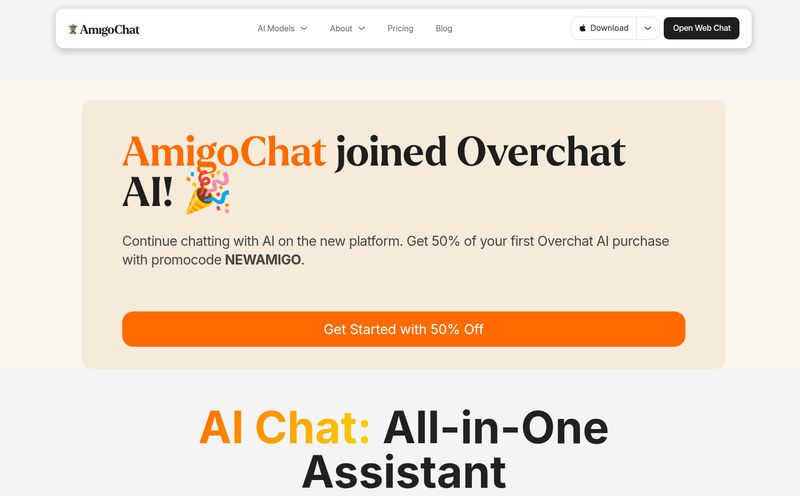Navigating the internet in 2024 feels like trying to drink from a firehose. A firehose that’s spewing news, opinions, hot takes, 'ten weird tricks', and a whole lot of... well, let's call it fluff. For years, as an SEO and content guy, my job has been to understand this chaos. To create clarity, build trust, and frankly, to rank. But on a personal level? I'm just as tired as you are of trying to figure out what’s real and what’s just cleverly disguised marketing or propaganda.
We’ve all been there. You read an article that gets your blood boiling, you’re ready to charge into the comments section, digital pitchfork in hand. Then you pause. Wait a minute… does this argument even make sense? Is the author conveniently leaving something out? It’s exhausting.
So when I heard about a tool called Skeptic Reader, my ears perked up. A browser plugin that acts as a real-time bias and logical fallacy detector? A little AI sidekick that whispers in your ear, “Hey, that’s a straw man argument”? Sign me up. I had to see if this was just more tech hype or a genuinely useful tool for a healthier information diet.
So, What Exactly is Skeptic Reader?
In a nutshell, Skeptic Reader is a free browser plugin for Chrome and Firefox. It's designed to be your personal critical thinking assistant. As you browse a web page or watch a YouTube video, it works in the background to analyze the content. Its main job is to sniff out two things we see all the time: observable biases and logical fallacies. You know, the sneaky tricks writers and speakers use to persuade you without relying on solid facts. It’s like having a philosophy professor on retainer, but without the tweed jacket and student loans.
The whole point isn’t to tell you an article is “bad” or “good.” Instead, it aims to give you the tools to make that call for yourself. It’s about fostering that little voice of informed skepticism that we should all have.

Visit Skeptic Reader
Putting It to the Test: The Core Features
Okay, so it sounds cool. But does it work? I installed the Chrome plugin (a painless, one-click affair) and took it for a spin across the wild plains of the internet. Here’s what I found.
On-the-Fly Bias and Fallacy Spotting
This is the main event. You’re reading an article, and Skeptic Reader highlights sentences or paragraphs, flagging them with potential issues. Think things like ‘Ad Hominem’ (attacking the person, not the argument) or ‘Appeal to Emotion’. It doesn’t just slap a label on it, it gives you a quick explanation of why it might be a fallacy. It’s pretty slick. It's not intrusive, but it's there when you need it. It’s the digital equivalent of a friend leaning over and saying, “You see what they did there?”
The Content 'Report Card'
This might be my favorite part. The tool generates a set of scores for the content you’re viewing: Balance, Logic, and Objectivity. This gives you a super quick, at-a-glance assessment. If you land on a page and the ‘Balance’ score is in the gutter, you immediately know you’re probably reading a one-sided take. As someone who analyzes competitor content for a living, this is a fantastic shortcut. It helps me gauge the angle and quality of a piece almost instantly.
More Than a Critic, It's a Sparring Partner
Here’s where Skeptic Reader really shines. It doesn't just point out flaws; it offers counter-argument suggestions. This is brilliant. It pushes you to think beyond the text in front of you. What’s the other side of the story? What are the valid points a reasonable opponent might make? This feature alone transforms it from a simple detector into a genuine critical thinking tool. It helps you build a more robust, 360-degree view of an issue.
It Even Watches YouTube With You
This is a big one. The plugin can analyze the transcripts of YouTube videos. In an age where so much information (and misinformation) is consumed via video, this is a killer feature. It pulls the transcript and runs the same bias and fallacy analysis. I tried it on a few political commentary videos, and let’s just say… it had its work cut out for it. But it worked!
The Good, The Bad, and The Beta
No tool is perfect, especially one that’s still in beta and powered by AI (which we all know can be a bit… weird sometimes). So, let’s get real about the pros and cons.
On the plus side, its real-time, easy-to-use nature is a massive win. There’s no complex setup. The scoring metrics and counter-arguments are genuinely insightful. And the YouTube functionality is just plain smart. Its a great step forward for media literacy.
But, there are caveats. The detection is not 100% accurate. Sometimes it misses things, and other times it might flag something that’s contextually fine. It’s a guide, not a gospel. It relies on GPT-4o, which has its own inherent limitations and biases. Also, the developers are upfront that it might struggle on sites with tons of dynamic content or weird security policies (I'm lookin at you, bank websites). And remember, it's in beta. That means you should expect the occasional bug or quirk. It’s a work in progress.
An SEO's Take: Why This Matters for Us Content Folk
Okay, let me put my SEO hat back on. Why should marketers, bloggers, and content creators care about a tool like this? Because the principles it's built on are the future of content quality.
For years, Google has been screaming about E-E-A-T (Experience, Expertise, Authoritativeness, and Trustworthiness). A tool like Skeptic Reader is essentially a consumer-facing E-E-A-T checker. It measures trust, flags poor arguments, and exposes a lack of balance.
We can use this to our advantage:
- Self-Auditing: Run Skeptic Reader on your own articles. Are you making unintentional fallacious arguments? Is your bias showing a little too much? This is a great way to tighten your writing and make it more authoritative.
- Competitor Analysis: Analyze the top-ranking articles for your target keywords. Where are their arguments weak? What fallacies are they using? You can then create content that provides a more balanced, logical, and trustworthy perspective. That's how you win.
I genuinely believe that as AI gets more sophisticated, this kind of on-page analysis will become more common, maybe even one day a subtle part of how search engines gauge a page's quality.
Let's Talk Money: What's the Price?
This is the part where I usually look up the pricing tiers and break them down. So, I navigated to their website, clicked around, and went to find the pricing page. And I was greeted by a friendly... 404 Page Not Found.
Honestly? I love it. It's a perfect little imperfection for a tool still in beta. From what I can gather, Skeptic Reader is currently free. This makes total sense. They are in a public beta phase, gathering data and feedback. So for now, you can get all this analytical power without spending a dime. I'd grab it while it's free, because tools this useful don't usually stay that way forever.
Frequently Asked Questions
Is Skeptic Reader completely free to use?
As of right now, yes. It appears to be completely free while it's in its public beta testing phase. This could change in the future, but for now, you can install and use it at no cost.
How accurate is the bias and fallacy detection?
It's impressively good, but not perfect. Think of it as a highly intelligent assistant, not an infallible judge. It provides excellent guidance, but you should always combine its suggestions with your own critical thinking.
Does Skeptic Reader work on every single website?
It works on the vast majority of websites, including major news sites and YouTube. However, it may have limitations on websites with very heavy dynamic content or strict security protocols that block scripts from running.
Can it analyze the video content of a YouTube video?
Not directly. It analyzes the text from the video's transcript. This means it's analyzing the spoken words, not the visual elements or tone of voice in the video itself.
What AI technology powers Skeptic Reader?
The tool is built on OpenAI's GPT-4o model, which is one of the most advanced language models currently available to the public.
Final Verdict: Is Skeptic Reader Worth the Install?
Absolutely. Yes. A thousand times, yes.
Skeptic Reader isn't a magic bullet that will instantly solve misinformation. It won't tell you what to believe. What it does do, and does beautifully, is act as a mental whetstone. It sharpens your own ability to dissect arguments, question sources, and see the architecture behind the words. It encourages you to be an active, engaged reader rather than a passive consumer of content.
For a tool that's free and still in beta, it’s remarkably polished and incredibly valuable. Whether you're a student, a researcher, a content creator, or just someone who wants to be a little smarter about the information you consume online, this is a no-brainer. Go install it. Your brain will thank you.
Reference and Sources
- Skeptic Reader Official Website: The official home for the plugin, though some pages may be under construction. I won't link the 404 page, you'll have to find that easter egg yourself!
- Google's E-E-A-T Guidelines: Google's Own Explanation of Creating Helpful, Reliable, People-First Content.
- Plugin Stores: Available on the Chrome Web Store and Firefox Browser ADD-ONS.



